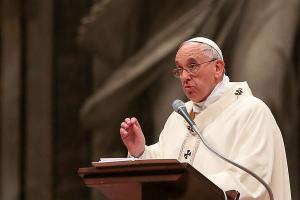
Pope Francis: Death penalty a legalistic value, not a Christian one
FREE Catholic Classes
The death penalty is always a rejection of the Gospel and of human dignity, and therefore must be rejected by all countries, Pope Francis told the Delegation of the International Commission against the Death Penalty on Monday.

Highlights
Catholic Online (https://www.catholic.org)
12/17/2018 (7 years ago)
Published in Europe
Keywords: Pope Francis, Death penalty, Christian one
Vatican City, (CNA/EWTN News) - In his meeting with the delegation at the Vatican, the Pope set aside his prepared remarks and gave an impromptu address.
In his prepared text, which was then handed out to the delegation, Francis said he has prioritized the abolition of the death penalty throughout his ministry because of the great harm it does to human dignity.
"The certainty that every life is sacred and that human dignity must be safeguarded without exception has led me, from the beginning of my ministry, to work at different levels for the universal abolition of the death penalty," he said.
The Pope in August ordered a revision of paragraph 2267 of the Catechism of the Catholic Church, calling the death penalty "inadmissible" and urging its elimination. The Pope called for the changes in May, the final draft of the new paragraph was issued by the Congregation for the Doctrine of the Faith.
The Catechism previously taught that the state had the authority to use the death penalty in cases of "absolute necessity," though with the qualification that the Church considered such situations to be extremely rare.
The previous version of paragraph 2267 in the Catechism of the Catholic Church had stated: "Assuming that the guilty party� s identity and responsibility have been fully determined, the traditional teaching of the Church does not exclude recourse to the death penalty, if this is the only possible way of effectively defending human lives against the unjust aggressor."
In his address on Monday, Pope Francis said the change in the Catechism expressed a "progress of the doctrine of the most recent Pontiffs as well as the change in the conscience of the Christian people, which rejects a penalty that seriously harms human dignity."
The death penalty was a lingering value of bygone centuries, Pope Francis said, during which "the instruments available to us for the protection of society were lacking and the current level of development of human rights had not yet been achieved."
It hearkens to a time when legal values were extolled over Christian ones and justice prevailed over mercy, he added.
"The Church cannot remain in a neutral position in the face of the current demands for the reaffirmation of personal dignity," he said.
Today, the Church rejects the death penalty in all cases because it "counters the inviolability and the dignity of the person" and denies guilty people the "hope of redemption and reconciliation with the community," he said.
Pope Francis encouraged members of the United Nations to continue to observe the group's moratorium on the use of the death penalty, first issued in 2007, which asks member countries to suspend the application of the death penalty and to work toward its total abolition.
He also invited non-UN-member countries to take steps toward eliminating the death penalty.
"The suspension of executions and the reduction of crimes punishable by capital punishment, as well as the prohibition of this form of punishment for minors, pregnant women or people with mental or intellectual disabilities, are minimum objectives with which leaders around the world must engage," the pope said.
Francis urged those who work in the field of criminal justice to work to understand the root causes of violence and crime, in order "to address the ethical and moral problems that arise from conflict and social injustice, to understand the suffering of the specific people involved and to reach other types of solutions that do not deepen those sufferings."
He also condemned the "regrettably recurrent phenomenon" of "extrajudicial, summary or arbitrary executions" carried out by state authorities in many countries.
"As a consequence, any use of lethal force that is not strictly necessary for (self-defense and preservation of life) can only be considered an illegal execution, a state crime."
The Pope thanked then the delegation for their work and assured them of the Church's support.
"The Church is committed to (the abolition of the death penalty) and I hope that the Holy See will collaborate with the International Commission against the Death Penalty in the construction of the necessary consensus for the eradication of capital punishment and all forms of cruel punishment."
---
'Help Give every Student and Teacher FREE resources for a world-class Moral Catholic Education'
Copyright 2021 - Distributed by Catholic Online
Join the Movement
When you sign up below, you don't just join an email list - you're joining an entire movement for Free world class Catholic education.
A Lenten Message from Sister Catherine - Please Watch
- Easter / Lent
- 5 Lenten Prayers
- Ash Wednesday
- 7 Morning Prayers
- Mysteries of the Rosary
- Litany of the Bl. Virgin Mary
- Popular Saints
- Popular Prayers
- Female Saints
- Saint Feast Days by Month
- Stations of the Cross
- St. Francis of Assisi
- St. Michael the Archangel
- The Apostles' Creed
- Unfailing Prayer to St. Anthony
- Pray the Rosary
![]()
Copyright 2026 Catholic Online. All materials contained on this site, whether written, audible or visual are the exclusive property of Catholic Online and are protected under U.S. and International copyright laws, © Copyright 2026 Catholic Online. Any unauthorized use, without prior written consent of Catholic Online is strictly forbidden and prohibited.
Catholic Online is a Project of Your Catholic Voice Foundation, a Not-for-Profit Corporation. Your Catholic Voice Foundation has been granted a recognition of tax exemption under Section 501(c)(3) of the Internal Revenue Code. Federal Tax Identification Number: 81-0596847. Your gift is tax-deductible as allowed by law.







